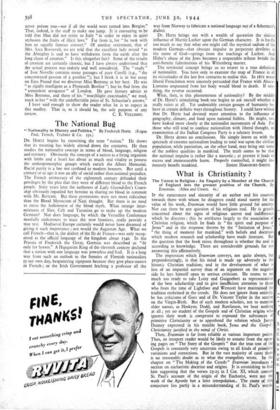The National Bug
,6 Nationality in History and Politics." By Frederick Hertz. (Kegan Paul, Trench, Trubner & Co. 258.) DR. HERTZ begins by examining the term " nation." He shows that its meaning has widely altered down the centuries. He then studies the nationalist concept in terms of blood, language, religion and territory. Obviously the concept of a nation as a living organism with limbs and a heart has about as much real vitality as possess the anthropomorphic groups which enrich the Albert Memorial. Racial purity is a bee not confined to modern bonnets. But until a century or so ago it was an ally of social rather than national prejudice. The French aristocracy of the eighteenth century defended their privileges by the plea that they were of different blood to the French people. Sixty years later the authoress of Lady Gwendolen's Court- ship obviously regarded her heroine as sharing no blood in common with Mr. Bertram. But these pretensions were not more ridiculous than the Blood Mysticism of Nazi thought. But there is no need to stress the hollowness of the blood myth. What strange inter- mixtures of Slav, Celt and Turanian go to make up the modern German? Nor does language, by which the Versailles Conference manfully endeavours to trace the new frontiers, really provide a true test. Mediaeval Europe certainly would never have dreamed of giving it such importance ; nor would the Augustan Age. What we call French—that is, the dialect of the Ile de France—was only recog- nised as the official language of the kingdom about 154o. In the Prussia of Frederick the Great, German was described as " fit only for horses." A Hu,ngarian King of the eleventh century declared that a nation with one language was powerless and frail. It is a long way from such an outlook to the frenzies of Flemish nationalists in our own day, bespattering signposts because they give place-names in French ; or the Irish Government fetching a professor all the
way from Norway to fabricate a national language out of a fishermen's dialect.
Dr. Hertz brings out with a wealth of quotation the sinister influence of Martin Luther upon the German character. It is hardly too much to say that what one might call the mystical sadism of the modern German—that obscure impulse to perpetrate devilries in the name of God—springs from the teachings of Luther. And Hitler's abuse of the Jews becomes a respectable tribute beside the anti-Semite fulminations of his Wittenberg master.
The territorial concept brings us no nearer to a true definition of nationality. You have only to examine the map of France in all its vicissitudes of the last five centuries to realise this. In 1871 many liberal Frenchmen were sincerely persuaded that France with Alsace- Lorraine amputated from her body would bleed to death. If any- thing, the reverse occurred.
What, then, is this phenomenon of nationality? By the middle of Dr. Hertz's stimulating book one begins to ask oneself whether it really exists at all. Yet undeniably certain groups of humanity be- have in certain definite ways throughout history. I could have wished that Dr. Hertz had devoted more attention to the influence of geography, climate, and food upon national foibles. He might, too, have looked more closely at the nationalist movements of Asia. For those who still tend to confuse nationalism with liberal thought, an examination of the Indian Congress Party is a salutary lesson.
Dr. Hertz draws no conclusions. He simply leaves us with the spectacle of extreme nationalism leading to total war upon the civilian population, while patriotism, on the other hand, may bring out some of the noblest qualities in mankind. The truth seems to be that the national impulse is rather like a narcotic ; at present it leads to excess and immeasurable harm. Properly controlled, it might im-






























 Previous page
Previous page